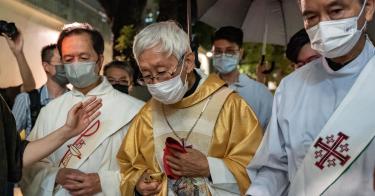Catholic Cardinal Joseph Zen appeared before a Hong Kong court Tuesday on charges of “conspiracy to collude with foreign forces.” The charges brought against the cardinal are emblematic of a permanent deterioration in the city-state—one that should prompt the Vatican to reconsider earlier attempts to pursue closer relations with China.
While the Hong Kong government claimed that the arrest of the 90-year-old retired archbishop was solely based on his involvement with the 612 Humanitarian Relief Fund, his outspokenness on the Chinese Communist Party’s persecution of Christians suggest that there are other motivations to limit his authority as a religious leader.
Zen became bishop of the Hong Kong Diocese in 2002, was elevated to cardinal by Pope Benedict XVI in 2006, and retired in 2009. His activism in defense of political freedom and of the Catholic Church in China and Hong Kong has defined his ministry.
In 2011, he embarked on a three-day hunger strike to protest the Hong Kong Supreme Court’s decision to increase Chinese control over Christian education. Additionally, he gave financial assistance to Catholics in mainland China, and peacefully rallied Hong Kong Christians in the 2014 Occupy Central movement and 2019 pro-democracy demonstrations. He has also voiced criticism of the 2018 deal between China and the Vatican.
The China-Vatican deal, strongly supported by Pope Francis and Vatican Secretary of State Pietro Parolin, intended to address the appointment of bishops and ameliorate divisions between the underground church and the state-sponsored Catholic Patriotic Association. The Vatican also recognized seven excommunicated bishops who were selected by the Chinese government. Critically, the 2018 deal gave the Vatican veto power over Catholic bishops nominated by Beijing. Francis hoped that it would create a medium for “dialogue” between China and the Vatican.
However, Zen said that it would “kill” and “sell out” the underground church. He also expressed a deep mistrust of Parolin, considering him as someone driven by politics rather than faith.
The China-Vatican deal might also have some implications for Taiwan. In January, the Vatican announced plans to remove apostolic nuncio Monsignor Arnaldo Catalan from his post in Taiwan. That has raised concerns that the Vatican might switch its official recognition of Taiwan to establish diplomatic relations with China.
The deal was inked against a backdrop of ever-increasing religious persecution in China. Clergy who refuse to kowtow to Beijing’s orders are jailed and subject to brainwashing and torture. In Hong Kong, Christian schools are forced to teach about the National Security Law, and priests have started to self-censor. Hong Kong Catholics fear that the National Security Law will further limit religious freedom. Even the Tiananmen Square massacre memorial Masses were canceled this year.
The dire situation embodied by Zen’s arrest and growing repression against the church has elicited mixed responses. Vatican spokesman Matteo Bruni expressed “concern” over the cardinal’s arrest. Parolin said that he didn’t want Zen’s arrest to affect the Vatican’s deal with China, which is expected to be renewed this fall. Otherwise, the Vatican has been silent on the Chinese Communist Party’s persecution of Christians and other religious minorities.
The Vatican should discontinue its efforts to cozy up to Beijing. The 2018 deal was renewed in 2020 and is up for renewal later this year. The Vatican should not renew the deal or take any additional steps to switch official recognition from Taiwan to Beijing.
Instead, the Vatican should speak more urgently on behalf of persecuted Christians in China.
Zen is the “new conscience of Hong Kong” and has made his mark on Asia. While the faithful may feel “sold out” by the Vatican’s deal, Zen stands resolute in his defense of Catholicism. Hong Kong authorities may throw the cardinal in jail, but they cannot jail Christianity and the hope it offers to so many of China’s faithful.
This piece originally appeared in The Daily Signal



